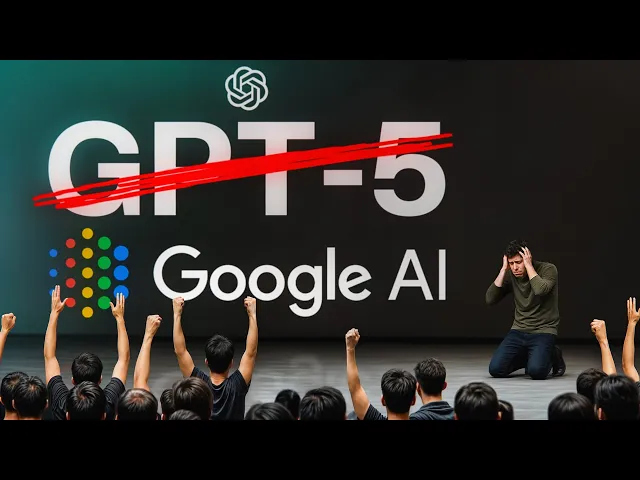Goodbye GPT-5… Google AI and Claude 4 are HERE! AI News EXPLAINED

Google's Pixel AI era begins now
In the tech world, tectonic shifts happen in slow motion until suddenly they don't. This week's Google I/O event delivered what might be the biggest AI advancement since ChatGPT first shocked the world in late 2022. The company revealed an astonishing array of practical AI tools that will fundamentally change how we interact with technology, all centered around their new Gemini models and coming first to Pixel devices.
Key Points
- Google unveiled Gemini 1.5 Pro and Flash models that bring unprecedented AI capabilities to phones, with Pixel devices becoming the first "AI-native" phones integrating these powerful models directly on-device
- Google's Assistant with Bard (soon to be "Gemini") can now handle complex tasks like summarizing emails, researching products, and even interacting with other apps on your phone
- Anthropic released Claude 3.5 Sonnet, achieving superior performance to GPT-4 across most benchmarks, highlighting intensifying competition among frontier AI models
The AI World Just Changed
The most significant revelation from Google I/O wasn't just technical specs or benchmark scores—it was the clear shift toward actually delivering practical AI utility through consumer products. For years, AI announcements have felt like science experiments with unclear real-world applications. Now, Google's approach of integrating Gemini directly into Pixel phones represents a fundamentally different way of thinking about AI.
This matters enormously for the business landscape. Companies that have been taking a "wait and see" approach to AI adoption now face a stark reality: consumers will soon have extraordinarily powerful AI tools in their pockets. This creates both opportunity and urgency for businesses to develop strategies around AI-enabled customer experiences.
Consider what Google demonstrated: the ability for AI to understand the context of your day, manage your communications across platforms, help research complex decisions, and even take actions on your behalf. This represents a significant shift in how users will expect to interact with all digital services moving forward.
The Competitive Landscape is Evolving Rapidly
While Google captured headlines with its Pixel announcements, the broader AI race continues to intensify. Anthropic's release of Claude 3.5 Sonnet demonstrates that Google and OpenAI aren't the only players capable of pushing
Recent Videos
How To Earn MONEY With Images (No Bullsh*t)
Smart earnings from your image collection In today's digital economy, passive income streams have become increasingly accessible to creators with various skill sets. A recent YouTube video cuts through the hype to explore legitimate ways photographers, designers, and even casual smartphone users can monetize their image collections. The strategies outlined don't rely on unrealistic promises or complicated schemes—instead, they focus on established marketplaces with proven revenue potential for image creators. Key Points Stock photography platforms like Shutterstock, Adobe Stock, and Getty Images remain viable income sources when you understand their specific requirements and optimize your submissions accordingly. Specialized marketplaces focusing...
Oct 3, 2025New SHAPE SHIFTING AI Robot Is Freaking People Out
Liquid robots will change everything In the quiet labs of Carnegie Mellon University, scientists have created something that feels plucked from science fiction—a magnetic slime robot that can transform between liquid and solid states, slipping through tight spaces before reassembling on the other side. This technology, showcased in a recent YouTube video, represents a significant leap beyond traditional robotics into a realm where machines mimic not just animal movements, but their fundamental physical properties. While the internet might be buzzing with dystopian concerns about "shape-shifting terminators," the reality offers far more promising applications that could revolutionize medicine, rescue operations, and...
Oct 3, 2025How To Do Homeless AI Tiktok Trend (Tiktok Homeless AI Tutorial)
AI homeless trend raises ethical concerns In an era where social media trends evolve faster than we can comprehend them, TikTok's "homeless AI" trend has sparked both creative engagement and serious ethical questions. The trend, which involves using AI to transform ordinary photos into images depicting homelessness, has rapidly gained traction across the platform, with creators eagerly jumping on board to showcase their digital transformations. While the technical process is relatively straightforward, the implications of digitally "becoming homeless" for entertainment deserve careful consideration. The video tutorial provides a step-by-step guide on creating these AI-generated images, explaining how users can transform...
